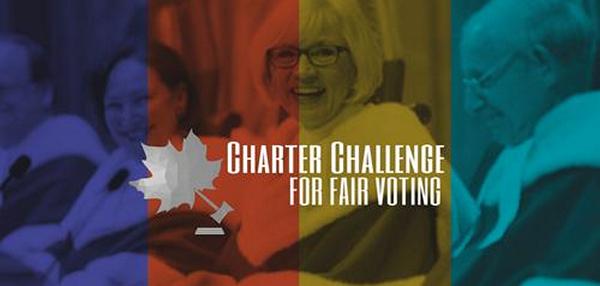Opposition to Outmoded First-Past-the-Post Electoral System
Federal Government Finally Responds to Charter Challenge
On September 29, Fair Voting BC and Springtide Collective for Democratic Society announced that the federal government has finally responded to a Charter Challenge of the first-past-the-post (FPTP) system of elections they filed two years ago, on October 6, 2019. The government advised it will be filing its legal documents in early spring 2022. The case is expected to be heard in fall 2022.
 The two organizations have set up a joint organization and website called Charter Challenge for Fair Voting (CCFV). Their application asks the Court for a one-year suspended ruling striking down sections of the Canada Elections Act and giving the Parliament one year to enact amendments.
The two organizations have set up a joint organization and website called Charter Challenge for Fair Voting (CCFV). Their application asks the Court for a one-year suspended ruling striking down sections of the Canada Elections Act and giving the Parliament one year to enact amendments.
In their application to the Ontario Superior Court of Justice, CCFV argues that the FPTP system violates Section 3 of the Charter of Rights and Freedoms which states “Every citizen of Canada has the right to vote in an election of members of the House of Commons or of a legislative assembly and to be qualified for membership therein.” The applicants state that Section 3 embodies “three overarching rights: 1) effective representation; 2) meaningful participation (including a free and informed vote); and 3) fair and legitimate elections.” On its website, CCFV references a ruling by then Chief Justice of the Supreme Court Beverley McLachlin who stated that “Each citizen is entitled to be represented in government. Representation comprehends the idea of having a voice in the deliberations of government.”
Fair Voting BC and Springtide Collective for Democratic Society also argue that Section 15(1) of the Charter is violated. This section states: “Every individual is equal before and under the law and has the right to the equal protection and equal benefit of the law without discrimination and, in particular, without discrimination based on race, national or ethnic origin, colour, religion, sex, age or mental or physical disability.”
The Charter does not specifically cite political belief/affiliation as a target of discrimination that falls under its protection. The applicants nonetheless state it should be treated as such and argue that FPTP “disadvantages voters of small parties with particular ideologies or lenses, particularly where they are geographically dispersed.” It says these voters “are less able to successfully elect an MP who will represent their views in Parliament,” leaving them “without a voice in Parliament.”
Before considering arguments on these claims, the Court will have to decide if it will grant “public interest standing” to Fair Voting BC and Springtide. The applicants must establish that the issue to be adjudicated is of broad public concern and that they qualify as legitimate representatives and experts on the matter.
The application states: “The present application raises serious justiciable issues. The rights to vote and to legal and political equality are among the most fundamental rights accorded to Canadians. The constitutionality of Canada’s electoral system is an issue of profound and far-reaching consequence that goes to the very heart of our legal and political order. Under FPTP, voters in an electoral district who do not vote for the elected MP are marginalized and systemically disenfranchised. They effectively have no voice in Parliament. Politicians elected through FPTP have a vested interest in maintaining this electoral system, as do voters who benefit from a disproportionately enhanced influence in government.”
The application provides the credentials of the two organizations and argues they are in “the best position to advance in a non-partisan fashion these broad issues in a court of law.”
Renewal Update will keep readers informed about this lawsuit which it considers is of concern to the polity because the current electoral system is not representative as it claims to be. Renewal Update will also provide information on related issues such as what are called constitutional conventions and the theory of representation also known as Covenant Thesis. The studies the Marxist-Leninist Party of Canada (MLPC) has been conducting for several years now show that any system based on this theory is obsolete and requires profound democratic renewal.
The application of Fair Voting BC and Springtide Collective for Democratic Society can be read in full here.


